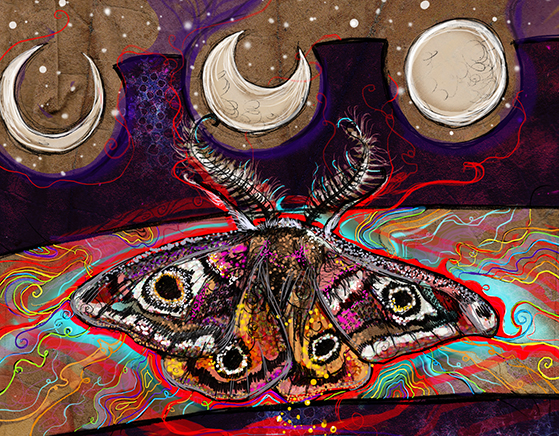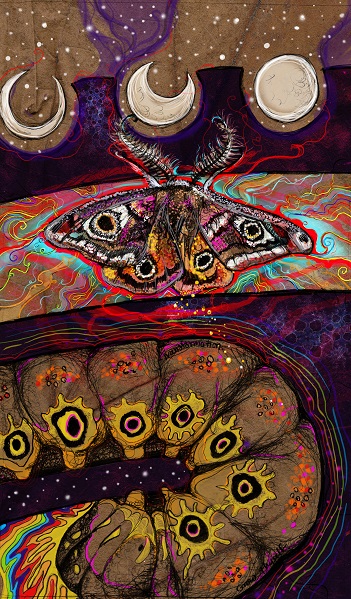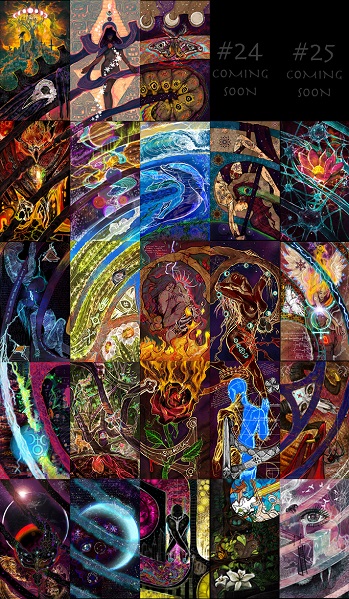The Labyrinth: A Series of Art. {Part Twenty Three: Sacred Reinvention}
“Who are you?” said the Caterpillar. This was not an encouraging opening for a conversation. Alice replied, rather shyly, “I… I hardly know, sir, just at present… at least I know who I was when I got up this morning, but I think I must have been changed several times since then.” ~ Lewis Carroll, Alice in Wonderland
Such a simple yet profound question Lewis Carroll poses by his classic character of the Caterpillar in Alice in Wonderland.
It’s been a bizarre couple of years, and I imagine many of us have had our identities rocked a bit. Who are you now? Not who are you as in what you do for work, where you party on weekends, what you were raised to be, or what religion or political party you belong to. But who are you? At a fundamental level.
In that place that is private and oftentimes so vulnerable that hardly do we live it out loud. But when on lockdown for a few years, feeling somewhat alone and displaced, who are you?
You didn’t lose yourself. Perhaps you are just now seeing yourself for the first time in earnest without any distractions. Perhaps these past several years have been a kind chrysalis for the soul, and oftentimes staring in earnest at your soul can be very uncomfortable and highly vulnerable.
There isn’t a more obvious symbol for transformation than a butterfly. But rarely do we look at their less popular cousins, the moths, who in all actuality are quite similar and in many cases just as as dazzlingly beautiful, if not more so, with unique differentiators. Unlike butterflies, most moths are nocturnal, and also attracted to light.
In many esoteric popular thoughts, moths are connected to rebirth and regeneration. They also represent feminine energy (nighttime, yin) and the moon. Therefore they are known to preside over our hidden natures, and consequently believed to help you discover and awaken to your truest self.
They morph and transform from caterpillars to winged things just like butterflies, and can be symbolic of freedom and transformation, but from the wisdom of the shadow nature — that which is hidden.
Constantly being pulled towards the flame, it is still a mystery as to why they are drawn to light. However, there is a powerful symbolism in this from the standpoint that within our nature we are instinctively being pulled towards something we do not fully comprehend, even when we fee it (instinctually).
There are many theories as to why moths are drawn to flames, but none have been proven. Perhaps that is how it is meant to be with the moth? Left somewhat mysterious but very much in existence, this driving force. As in life, you can’t prove instinct (or intuition) yet you can’t deny its pull.
I believe there are some things in this world we are never meant to prove or understand, but rather simply experience and allow the mystery to flow over and through us, as the caterpillar does when it forms its chrysalis with intent to transform. It doesn’t realize its metamorphosis, it just goes there instinctually through darkness and vulnerability.
Engaging with the mystery is to be one with the Divine, and the moth seems to understand this, fluttering towards the light from shadow catching our eye, as oftentimes our truths flail in the darkness, seeking a light source so they can be seen and recognized.
Once you let the silent prophecy within your heart catch your eye, and recognize it, this becomes the light needed to draw out the transformation, and now begins your sacred reinvention — a breaking down of who you always thought you were, and a blossoming into something else entirely.
Now, who are you really?
This is an ongoing series by Kristi Stout. Tune in monthly for the next chapter in ‘The Labyrinth’. If her art resonates with you, and you’d like prints, contact her through her website or Facebook.



